When the Marriage Act 1961 was amended last year to recognise marriages, irrespective of the gender of the parties, laws about who was a parent may not have kept up. Each of the States and Territories will now need to look at their laws to ensure that who is recognised as the spouse of a person who gave birth is recognised as a parent when there has been a child born through the help of assisted reproductive treatment.
Commonwealth law provides the saving grace, but it would be very helpful if State and Territory laws were consistent. The example that I give is under the Status of Children Act 1978 (Qld). This Act covers parentage presumptions, i.e. who is a parent of a child. Just because someone is genetically a parent does not make them the parent as a matter of law. Division 2 is called: Parentage presumptions of children conceived by fertilisation procedures. Subdivision 1 concerns interpretation. Subdivision 2 concerns fertilisation procedures of married women with their husbands consent. Subdivision 2A is called Fertilisation procedures – women with female de facto partners’ consent. Subdivision 3 is for everyone else: Fertilisation procedures – other married women and unmarried women. For a lesbian couple who have married, this division does not apply to them. Section 20 makes plain:
“This subdivision applies if –
(a) a married woman undergoes a fertilisation procedure other than with her husband’s consent; or
(b) a woman who is not married and does not have a de facto partner or civil partner undergoes a fertilisation procedure; or
(c) a woman who has a de facto partner undergoes a fertilisation procedure other than with her partner’s consent; or
(d) a woman who has a civil partner undergoes a fertilisation procedure other than with her partner’s consent.”
So it seems as though married lesbian couples are not covered under parentage presumptions. Therefore you might think that neither woman is recognised as a parent. Instead, the woman who gave birth will generally be recognised under our law as the mother. This is because the focus of the law since 700CE, in the time of the Emperor Justinian, is that the mother is always certain, i.e. she is the one who gave birth.
The status of her wife is not provided for under the Queensland legislation.Under Queensland law, therefore, when a child is born through assisted reproductive treatment to a married lesbian couple, only the birth mother is recognised as a parent.
Family Law Act to the rescue
Section 60H of the Family Law Act provides that both women are the parents. Under section 109 of the Commonwealth Constitution where the State and Federal laws are inconsistent, the Federal law prevails to the extent of the inconsistency. Section 60H(1) provides:
“(1) If:
(a) a child is born to a woman as a result of the carrying out of an artificial conception procedure while the woman was married to, or a de facto partner of, another person (the other intended parent ); and
(b) either:
(i) the woman and the other intended parent consented to the carrying out of the procedure, and any other person who provided genetic material used in the procedure consented to the use of the material in an artificial conception procedure; or
(ii) under a prescribed law of the Commonwealth or of a State or Territory, the child is a child of the woman and of the other intended parent;
then, whether or not the child is biologically a child of the woman and of the other intended parent, for the purposes of this Act:
(c) the child is the child of the woman and of the other intended parent; and
(d) if a person other than the woman and the other intended parent provided genetic material–the child is not the child of that person.”
It is possible that a clerk at the Registrar of Births, Deaths and Marriages may, in relying on the State legislation, refuse to recognise the non-birth mother as a parent on the birth certificate. To have done so would be in breach of the Family Law Act, inconsistent Federal legislation. Hopefully that day will not come to pass. Let’s wait and see.
The sooner that State and Territory legislation is checked, and amended to be consistent with the equal marriage changes, the better.












